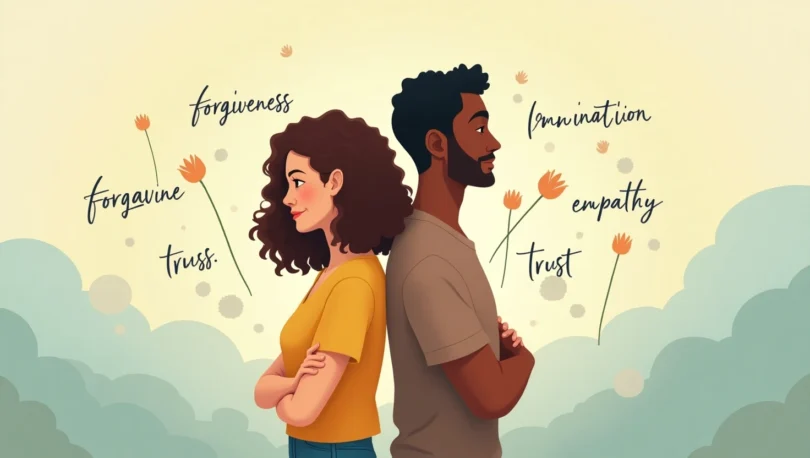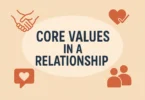Words have the power to heal, but they can also deeply wound—especially when spoken by someone we love. In a relationship, hurtful words can leave lasting emotional scars, affecting trust, communication, and overall connection. Whether spoken in anger, frustration, or carelessness, these words can shake your confidence and create distance between you and your partner.
If you’ve ever felt the sting of harsh words, you’re not alone. The good news? Healing is possible. By learning how to process your emotions, communicate effectively, and rebuild trust, you can not only overcome the pain but also strengthen your relationship in the process.
In this guide, we’ll explore 7 powerful ways to get over hurtful words and create a healthier, more resilient bond with your partner. Whether you’re looking to heal from past wounds or prevent future conflicts, these strategies will help you move forward with love, understanding, and emotional strength. Let’s dive in!
Headlines
Understanding the Impact of Hurtful Words in a Relationship
- The Emotional and Psychological Effects of Hurtful Words
- Why People Say Hurtful Words in Relationships
7 Powerful Ways to Heal from Hurtful Words
Strengthening Your Relationship After Hurtful Words
Understanding the Impact of Hurtful Words in a Relationship
The Emotional and Psychological Effects of Hurtful Words
Words have the power to build or break a person, especially in a relationship where emotional connection and trust are key. When hurtful words are spoken, their impact goes beyond the moment of conflict—they can leave lasting emotional and psychological scars. Here’s how:
1. Damage to Self-Esteem and Self-Worth
One of the most immediate effects of hurtful words is a blow to self-esteem. When a partner makes critical, insulting, or demeaning remarks, the receiving person may start questioning their self-worth. Over time, they might internalize these negative words, believing they are not good enough or lovable. This can lead to feelings of inadequacy, self-doubt, and even depression.
2. Increased Anxiety and Emotional Distress
Hurtful words can create an environment of emotional instability in a relationship. If one partner frequently uses harsh or demeaning language, the other may start feeling anxious, walking on eggshells to avoid conflict. This constant worry can lead to stress, tension, and a sense of emotional exhaustion. In some cases, prolonged exposure to verbal hurt can contribute to symptoms of anxiety disorders.
3. Erosion of Trust and Emotional Security
A loving relationship thrives on trust and emotional security. When a partner says hurtful things, it can make the other person feel unsafe and unloved. They may start questioning their partner’s true feelings, wondering if the harsh words are a reflection of deeper resentment. This doubt can slowly chip away at trust, making it harder to feel emotionally connected and secure in the relationship.
4. Lingering Emotional Pain and Resentment
Unlike physical wounds, emotional wounds from words don’t heal easily. Even after an argument is resolved, the pain of hurtful words can linger. Some phrases can replay in the mind over and over again, causing prolonged emotional distress. If these feelings are not properly addressed, resentment can build, making future conflicts even more intense and difficult to resolve.
5. Impact on Mental Health and Well-Being
The cumulative effect of hurtful words can lead to long-term mental health struggles. When negative communication becomes a pattern, it can contribute to emotional trauma, depression, and even post-traumatic stress in extreme cases. People in verbally toxic relationships may develop unhealthy coping mechanisms, such as shutting down emotionally, avoiding communication, or withdrawing from their partner altogether.
6. Changes in Behavior and Relationship Dynamics
When someone is repeatedly subjected to hurtful words, their behavior in the relationship may change. They might become more defensive, distant, or emotionally closed off. Some may even mirror the behavior and start using hurtful words themselves as a form of self-protection. This can create a cycle of negativity that is hard to break, ultimately damaging the relationship further.
Final Thoughts
Hurtful words are more than just momentary expressions of frustration—they have real and lasting emotional consequences. Recognizing their impact is the first step toward healing and creating a healthier, more supportive relationship. By fostering better communication, understanding, and emotional intelligence, couples can work toward preventing verbal harm and nurturing a stronger, more loving bond.
Why People Say Hurtful Words in Relationships
Hurtful words don’t always stem from a place of malice—often, they are a reaction to deeper emotional triggers, unresolved issues, or learned behaviors. While they can cause pain, understanding the reasons behind them can help couples address the root cause and build healthier communication patterns. Here are some common reasons why people say hurtful words in relationships:
1. Uncontrolled Emotions and Stress
Many hurtful words are spoken in moments of frustration, anger, or stress. When emotions run high, people may lose control over their words, saying things they don’t truly mean. This often happens because:
- The brain’s emotional center (the amygdala) overrides rational thinking, leading to impulsive reactions.
- Stress from external factors (work pressure, financial worries, personal struggles) spills over into the relationship, causing unintended verbal outbursts.
- A lack of emotional regulation skills makes it difficult to express frustration in a healthy way.
Solution: Practicing mindfulness, taking deep breaths before responding, and stepping away from heated conversations can help prevent emotionally driven hurtful words.
2. Poor Communication Skills
Not everyone grows up in an environment where healthy communication is taught. Many people develop patterns of communication based on what they saw in their families or previous relationships. Common communication issues that lead to hurtful words include:
- Speaking without thinking about the emotional impact of words.
- Using criticism instead of constructive feedback.
- Relying on sarcasm, passive-aggressiveness, or blame instead of clear, open discussion.
Solution: Couples can benefit from learning assertive communication techniques, using “I” statements (e.g., “I feel hurt when…” instead of “You always hurt me”), and actively listening to each other’s concerns.
3. Unresolved Past Trauma or Insecurities
People who have experienced emotional wounds from past relationships, childhood neglect, or low self-esteem may project their fears and insecurities onto their partner. This can manifest as:
- Defensiveness or lashing out to protect themselves from perceived emotional harm.
- Using hurtful words as a way to control or diminish their partner’s self-worth, often unconsciously.
- Comparing the current relationship to past painful experiences, leading to misdirected anger.
Solution: Healing past wounds through self-reflection, therapy, or personal growth can help individuals break the cycle of emotionally harmful communication.
4. A Need for Power and Control
In some cases, hurtful words are used as a way to gain control in a relationship. This is common in unhealthy or toxic relationship dynamics, where one partner may:
- Use verbal attacks to dominate conversations and assert superiority.
- Diminish their partner’s confidence to make them feel dependent.
- Engage in emotional manipulation, guilt-tripping, or name-calling to get their way.
Solution: Recognizing manipulative behavior and setting healthy boundaries can help protect emotional well-being. If a pattern of verbal abuse emerges, seeking professional help or reevaluating the relationship is crucial.
5. Learned Behavior from Family or Society
Many people repeat the relationship patterns they observed in childhood. If someone grew up in a household where yelling, criticism, or insults were normal, they might carry those habits into their own relationships without realizing the damage they cause.
- Some cultures or societal norms may normalize verbal aggression as a way to express love or authority.
- People who lack role models for healthy communication may not understand how to express difficult emotions without being hurtful.
Solution: Awareness is key. Identifying harmful learned behaviors and actively working to unlearn them through therapy, self-education, or conscious effort can lead to healthier communication patterns.
6. Defensiveness and Feeling Attacked
Sometimes, people say hurtful words as a defense mechanism when they feel criticized, misunderstood, or vulnerable. Instead of addressing their emotions calmly, they react with:
- Counterattacks or blame-shifting.
- Bringing up past mistakes to divert attention from their own behavior.
- Sarcastic or dismissive remarks to shut down conversations.
Solution: Instead of reacting defensively, taking a moment to process emotions and responding thoughtfully can prevent escalation. Both partners should strive to create a safe space for open and honest dialogue.
7. Lack of Emotional Awareness
Some people simply do not realize the emotional weight their words carry. They might see their words as “just being honest” or “not a big deal,” while their partner experiences deep emotional pain. This often happens when:
- A person struggles with empathy or emotional intelligence.
- They downplay emotions, believing that words can’t be as harmful as actions.
- They fail to recognize that their partner’s emotional response is valid.
Solution: Developing emotional intelligence through self-awareness, empathy exercises, and active listening can help individuals become more mindful of how their words affect others.
Final Thoughts
Hurtful words in a relationship often stem from deeper emotional struggles, communication gaps, or learned behaviors. Understanding why they happen is the first step toward change. By fostering emotional intelligence, practicing mindful communication, and addressing past wounds, couples can move away from hurtful interactions and build a healthier, more supportive relationship.
7 Powerful Ways to Heal from Hurtful Words
1. Acknowledge and Process Your Emotions
The first step in healing from hurtful words is acknowledging how they made you feel. Suppressing emotions can lead to resentment, anxiety, and even physical stress. Instead of ignoring your feelings, take time to process them.
How to Process Your Emotions:
- Identify Your Feelings: Are you feeling rejected, disrespected, or misunderstood? Naming your emotions can help you understand your reaction.
- Write It Down: Journaling can be a powerful tool to release negative emotions and gain clarity.
- Practice Mindfulness: Breathing exercises and meditation can help calm your mind and prevent emotional overwhelm.
- Avoid Reacting Immediately: Give yourself time to reflect before responding to your partner. This prevents unnecessary conflict and helps you communicate more effectively.
By allowing yourself to process emotions in a healthy way, you gain control over your response rather than letting emotions dictate your actions.
2. Communicate with Your Partner Calmly
Once you’ve processed your emotions, it’s important to address the issue with your partner. Communication is key to understanding each other’s perspectives and preventing further hurt. However, the way you communicate matters.
Tips for Calm and Effective Communication:
- Use “I” Statements: Instead of saying, “You always say hurtful things,” try, “I felt really hurt when you said that.”
- Stay Calm: Avoid raising your voice or using accusatory language, as this can make the situation worse.
- Listen Actively: Give your partner a chance to explain their side without interrupting or assuming their intent.
- Pick the Right Time: Address the issue when both of you are calm rather than in the heat of an argument.
When handled properly, communication can turn a painful moment into an opportunity for growth and deeper understanding.
3. Set Boundaries for Respectful Conversations
Boundaries are essential in any healthy relationship. If hurtful words are a recurring issue, it’s important to set clear expectations on how you want to be treated.
How to Set Boundaries in Your Relationship:
- Express Your Limits Clearly: Let your partner know what kind of language or behavior is unacceptable.
- Agree on Conflict Guidelines: Create rules for arguments, such as avoiding name-calling or taking breaks if emotions run too high.
- Hold Each Other Accountable: If boundaries are crossed, address them immediately to prevent them from becoming a habit.
- Seek External Support if Needed: If your partner repeatedly disrespects your boundaries, consider relationship counseling to help navigate the issue.
Setting and enforcing boundaries ensures that both partners feel safe and respected in the relationship.
4. Practice Self-Care and Emotional Resilience
Healing from hurtful words requires inner strength and self-care. By nurturing your own well-being, you build resilience and reduce the emotional impact of negative words.
Ways to Prioritize Self-Care:
- Engage in Activities You Love: Whether it’s reading, painting, or exercising, doing things that bring you joy helps shift your focus away from negativity.
- Practice Positive Affirmations: Replace negative self-talk with empowering statements like “I am worthy of respect and love.”
- Spend Time with Supportive People: Surround yourself with friends and family who uplift and encourage you.
- Take Care of Your Body: A healthy diet, regular exercise, and sufficient sleep contribute to emotional stability and resilience.
The stronger you feel within yourself, the less power hurtful words will have over you.
5. Rebuild Trust and Strengthen the Bond
If hurtful words have created distance between you and your partner, rebuilding trust is crucial for moving forward. Trust takes time and effort from both partners.
Steps to Rebuilding Trust:
- Have Open and Honest Conversations: Discuss what led to the hurtful words and how to prevent similar situations in the future.
- Show Empathy and Understanding: Both partners need to acknowledge each other’s feelings and work toward resolution.
- Demonstrate Change Through Actions: Apologies should be backed by genuine efforts to improve communication and behavior.
- Be Patient: Healing doesn’t happen overnight. Give each other grace as you work through the pain together.
When trust is rebuilt, the relationship can become even stronger than before.
6. Learn to Let Go and Move Forward
Holding onto past hurt only prolongs pain. Learning to forgive doesn’t mean excusing hurtful words, but it allows you to free yourself from emotional baggage.
How to Let Go of Hurtful Words:
- Accept That Words Can’t Be Taken Back: Instead of dwelling on what was said, focus on what can be done to move forward.
- Practice Forgiveness for Your Own Peace: Forgiveness is more about releasing your own pain than about the other person.
- Reframe the Experience as a Lesson: Use the situation as an opportunity to improve communication and strengthen your bond.
Letting go of the pain allows you to embrace a healthier, more fulfilling relationship.
7. Seek Professional Help If Needed
If hurtful words are causing deep emotional distress or if they are part of a recurring toxic pattern, seeking professional help is a wise decision.
When to Consider Couples Therapy:
- If communication feels impossible without arguments.
- If past hurt keeps resurfacing despite efforts to move on.
- If emotional or verbal abuse is present in the relationship.
Benefits of Therapy:
- Provides a Safe Space for Open Conversations
- Offers Expert Guidance on Conflict Resolution
- Helps Identify and Address Deeper Relationship Issues
A therapist or relationship counselor can offer tools and strategies to help both partners communicate better and rebuild trust.
Strengthening Your Relationship After Hurtful Words
The Role of Consistent Positive Communication
Why It’s Important:
Positive communication is the foundation of a healthy and strong relationship. Words have the power to uplift and heal just as much as they can hurt and destroy. When you make a conscious effort to speak kindly, express appreciation, and communicate openly, you create a safe and loving environment for both partners.
Hurtful words can linger, but consistent positive communication helps replace negative emotional patterns with ones that foster trust, love, and connection. It reassures both partners that they are valued, respected, and emotionally secure.
How to Practice Consistent Positive Communication:
1. Express Appreciation Daily
- Why it matters: Many relationships suffer because partners feel unappreciated or taken for granted. Making an effort to verbally appreciate your partner strengthens emotional bonds.
- How to do it:
- Compliment your partner on the little things:
- “I love how thoughtful you are.”
- “Thank you for making me smile today.”
- Express gratitude for their efforts, even if they seem small.
- Celebrate their strengths instead of focusing on flaws.
- Compliment your partner on the little things:
- Example: Instead of only noticing what your partner does wrong, make it a habit to highlight what they do right.
2. Use Gentle and Encouraging Language
- Why it matters: The way you say things affects how your partner receives them. Even constructive feedback can sound like criticism if not phrased well.
- How to do it:
- Avoid using harsh, absolute words like “always” and “never” (e.g., “You never listen to me!”).
- Instead, use soft approaches like:
- “I feel unheard when we have these discussions. Can we work on this together?”
- Speak with kindness, even in disagreements.
- Example: Instead of saying, “You don’t care about me,” try, “I feel hurt when I don’t feel heard. Can we talk about this?”
3. Actively Listen and Validate Feelings
- Why it matters: Many conflicts arise because one partner feels unheard or dismissed. Active listening ensures both partners feel valued and respected.
- How to do it:
- Make eye contact and give your full attention when your partner speaks.
- Repeat what they said to confirm understanding (e.g., “So you’re feeling hurt because of what happened earlier?”).
- Avoid interrupting or dismissing their emotions.
- Example: Instead of responding defensively, try: “I see that what I said earlier hurt you. That wasn’t my intention, and I want to understand how you feel.”
4. Use More Positive Words Than Negative Ones
- Why it matters: Studies show that successful relationships maintain a 5:1 ratio of positive to negative interactions. This means for every one negative interaction, there should be five positive ones to maintain a strong emotional connection.
- How to do it:
- Make an effort to say more uplifting things than critical ones.
- Replace criticism with encouragement:
- Instead of “You never help me,” try “I’d love it if we could share responsibilities more.”
- Compliment, encourage, and reassure your partner regularly.
- Example: Saying “I’m so lucky to have you in my life” can have a stronger emotional impact than just assuming your partner knows how you feel.
5. Regularly Check In on Each Other’s Emotional Well-Being
- Why it matters: Life’s stresses can create emotional distance. Regular check-ins help keep the connection strong.
- How to do it:
- Set aside time weekly to talk about how both of you are feeling.
- Ask open-ended questions like:
- “How are you feeling about our relationship lately?”
- “Is there anything I can do to make you feel more loved?”
- Address small concerns before they become big issues.
- Example: A simple “How was your day?” followed by genuine listening can make a huge difference.
Final Thoughts:
Consistent positive communication isn’t just about avoiding negative words—it’s about intentionally speaking in a way that fosters love, trust, and respect. By expressing appreciation, using kind words, actively listening, and maintaining emotional check-ins, you can replace past hurt with a stronger, more fulfilling connection.
Start today by saying something kind to your partner—you’ll be surprised how small changes in words can transform your relationship! ❤️
Building a Stronger Emotional Connection
Why It’s Important:
A strong emotional connection is the glue that holds relationships together. It goes beyond physical attraction or shared activities—it’s about understanding each other’s deepest thoughts, feelings, and needs. Building an emotional connection fosters intimacy, trust, and mutual support, which are essential for overcoming difficulties, such as hurtful words, that may arise.
When there is a solid emotional foundation, partners are more likely to communicate openly, resolve conflicts constructively, and offer support when challenges occur. A strong emotional bond can also help both partners feel more secure and loved, reducing the impact of negative experiences.
How to Build a Stronger Emotional Connection:
1. Spend Quality Time Together
- Why it matters: The more time you spend together, the more you build a shared experience and understanding. Quality time allows you to reconnect and deepen your bond.
- How to do it:
- Prioritize each other: Dedicate time without distractions—no phones or TV. Engage in meaningful conversations or shared activities.
- Be present: Focus on your partner in the moment rather than worrying about other things.
- Create new memories together: Travel, try new hobbies, or attend events that you both enjoy.
- Example: A simple evening walk or cooking dinner together, without distractions, can create space for meaningful conversation and reconnection.
2. Practice Emotional Vulnerability
- Why it matters: Being vulnerable means showing your true self—your fears, hopes, insecurities, and desires. When both partners allow themselves to be vulnerable, they deepen their emotional connection and gain a better understanding of each other’s emotional world.
- How to do it:
- Share your inner thoughts and feelings: Instead of just talking about surface-level topics, open up about your fears, dreams, or past experiences that shaped who you are.
- Be open about your emotions: If something is bothering you, don’t hide it—express it in a healthy way, without blame.
- Encourage your partner’s vulnerability: Create a safe space for them to express themselves by listening without judgment.
- Example: “I’ve been feeling a little stressed at work, and it’s affecting my mood. I didn’t want to bring it up, but I feel better now that I’ve shared it with you.”
3. Show Empathy and Support
- Why it matters: Empathy is the ability to understand and share the feelings of another. When you show empathy, you let your partner know you truly care about their emotional state, which fosters a deeper connection.
- How to do it:
- Listen actively: When your partner is expressing their feelings, give them your full attention and reflect back what they’re saying to show understanding.
- Be supportive, not solution-focused: Sometimes, your partner just needs a listening ear rather than advice.
- Offer physical comfort: Small gestures like holding hands, hugging, or just sitting together in silence can provide emotional reassurance.
- Example: “I can see that you’re really upset. I’m here for you, and we can work through this together.”
4. Build Trust Through Consistent Actions
- Why it matters: Trust is the cornerstone of any strong emotional connection. Without trust, it’s difficult for both partners to feel emotionally secure, especially after a hurtful incident. Consistency in words and actions is essential to building and maintaining trust.
- How to do it:
- Follow through on promises: If you say you’ll do something, make sure you do it. Reliability fosters trust.
- Be transparent: Share your thoughts and feelings openly, and don’t hide important details.
- Respect each other’s boundaries: Trust grows when both partners feel their emotional needs are respected.
- Example: If you’ve promised to make time for a special date night, follow through on that promise. This shows your partner they can rely on you.
5. Celebrate Each Other’s Achievements
- Why it matters: A relationship should feel like a team, and celebrating each other’s successes, big or small, strengthens your emotional connection. This act of encouragement fosters a sense of mutual support and shared happiness.
- How to do it:
- Recognize milestones: Celebrate achievements in both personal and professional aspects of your partner’s life.
- Express genuine joy for their success: Show excitement and pride in their accomplishments, even if they seem small.
- Support their personal growth: Encourage your partner to pursue their passions and goals, and show that you’re rooting for them.
- Example: “I’m so proud of you for completing that project at work. Let’s celebrate tonight!”
6. Make Regular Emotional Check-Ins Part of Your Routine
- Why it matters: Relationships can sometimes drift apart if emotional needs are not regularly discussed and met. Emotional check-ins ensure that both partners feel heard, understood, and cared for.
- How to do it:
- Ask about feelings: Frequently ask your partner how they’re feeling, not just about the relationship but also about their life in general.
- Discuss potential concerns early: If there’s tension or an unresolved issue, address it before it festers into a bigger problem.
- Have regular heart-to-heart conversations: Make it a habit to check in with each other’s emotional state and reconnect emotionally.
- Example: “How are you feeling about us lately? Is there anything you need more of from me?”
Final Thoughts:
Building a stronger emotional connection requires continuous effort from both partners. It’s about creating an environment of mutual trust, support, and emotional safety where both people feel valued and heard. By spending quality time together, being emotionally vulnerable, practicing empathy, building trust, celebrating each other’s achievements, and having regular emotional check-ins, you create a deeper bond that can withstand challenges and help you overcome any hurtful words or negative experiences that may come your way.
When both partners nurture their emotional connection, they create a resilient relationship that can handle both the highs and lows of life. Take small, intentional steps every day to deepen your emotional connection, and watch your relationship grow stronger and more fulfilling.
Conclusion
Hurtful words can leave emotional wounds, but with the right approach, healing is possible. By acknowledging your emotions, setting boundaries, prioritizing self-care, and rebuilding trust, you can overcome the pain and strengthen your relationship.
Remember, every relationship faces challenges, but how you navigate them determines the strength of your bond. Commit to open communication, respect, and emotional resilience, and you’ll create a relationship built on love and understanding.
If this guide helped you, consider sharing it with someone who might need support in their relationship journey. 💙








[…] Intimacy challenges individuals to be more open, honest, and authentic. While physical intimacy alone may not always foster deep personal growth, emotional closeness provides the space to learn and evolve together as partners. […]